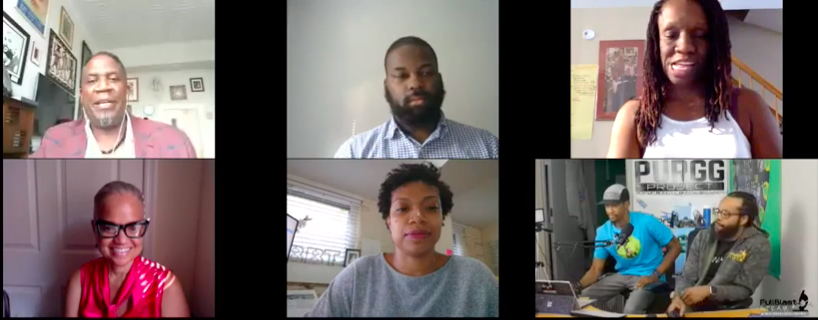It takes a village to build tech products that make change.
AccelerateBaltimore, ETC’s startup accelerator, kicked off proceedings at an opening event Wednesday by offering some introductions for the cohort of five startups and a chance to hear from speakers getting behind the effort.
While accelerators are typically in-person endeavors, one perk of the virtual format was immediately evident: Along with local leaders involved in organizing the 13-week program, the opening ceremony allowed influential voices from around the country to join the proceedings.
It also put a focus on this year’s civic-minded theme. There’s long been an orientation toward Baltimore for a program overseen by the Baltimore Development Corporation-backed incubator and supported by the Abell Foundation (which this year is funding $50,000 for each of the five startups). Yet this year it is going a step further as the startups in the program themselves are also specifically focused around solutions to the city’s most vexing problems. So along with business and tech, it’s clear that leaders believe the startups also must consider working with government and communities.
With that in mind, here are key quotes from the speakers at the event relevant to anyone building civic tech:
“Gone are the days of creating solutions without having those who are the most impacted at the table. It’s only through community engagement that we can be assured that the solutions to these civic challenges are actually sustainable.”
- Dionne Joyner-Weems, co-chair of Hack Baltimore
“The problem here is not that we’re setting our goals too high and missing, but rather too low and hitting.”
- John W. Davis, program director for AccelerateBaltimore
Davis, who is bringing background as a founder, lawyer and professor to direct the program, said there are 100 people contributing to the program. With the virtual format, the number of companies that will get access to the programming is also increasing. In addition to the five cohort members, over 30 CEOs are auditing the program, Davis said.
“Our goal and our mission is to make this city tech heavy, tech friendly and not have tech be used as a weapon against it, but a tool in its best interest.”
- Nancy Goldring, founder of the Sankofa Community Network
The evening program included a check-in with cohort members. In an update to the initial announcement, Sankofa is joining the cohort of five startups, while youth PPE maker enterprise Made@Dent will be participating in an audit capacity, Davis said.
“That combination of social entrepreneurship with community empowerment — those two together — is really beautiful.”
- Dan Porterfield, CEO of the Aspen Institute
Aspen Institute team members were involved in reviewing and judging applications, as well as policy work. “Baltimore is a place of incredible community heart and spirit,” said Porterfield, who is a Baltimore native.
“If we don’t talk about it, we don’t have a solution.”
- Gen. Michael Hayden, retired former director of the Central Intelligence Agency and Fort Meade-based National Security Agency
In conversation with Hayden, Davis put a focus on distrust of technology that exists in Black communities as a result of surveillance. This could affect startups launching new products using public data for good, Davis said. Given his own experience as head of the NSA after 9/11, when the agency’s warrantless wiretapping first came to light, Hayden said it was important to be open about why new technology might be good or bad for the public.
“We have to be willing to invite people from all backgrounds, especially our Black brothers and sisters, who have worked so hard in this city and we have to be willing to change the party. … We have to be willing to allow them to lead and to change and to teach us the dances.”
- Vernā Myers, VP of inclusion strategy at Netflix
It’s a sentiment building on her oft-repeated quote that “Diversity is being invited to the party, but inclusion is being asked to dance.” Given that Baltimore has seen an uprising for Black lives before following the death of Freddie Gray, Myers talked about the urgency of making change in the wake of the summer’s uprising following the death of George Floyd, and how this time must be different. That means going to a structural level, and starts with the teams that are bringing new solutions. “There’s no way to solve problems or to innovate on solutions without having inclusion and diversity,” said the Baltimore-rooted Myers.







